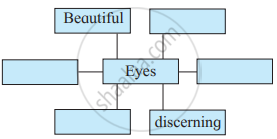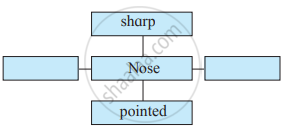Advertisements
Advertisements
Question
How do you distinguish between information gathering and insight formation?
Solution
A model answer has been provided for students' reference.
It is strongly recommended that students prepare the answer on their own.
There is a mass difference between the concepts of information gathering and insight formation. Information gathering refers to collection of data and facts. It means knowledge of specific events or situations that has been gathered or received by communication. Insight formation, on the other hand, refers to the perception one has of things through his deep understanding of a subject. Insight refers to the capacity to discern the true nature of a situation. Thus, it might differ from person to person, depending on everyone's ideas and concepts.
APPEARS IN
RELATED QUESTIONS
Give reasons for the following statement.
Tibetan mastiffs were popular in China’s imperial courts.
Do you think that the ruled always adopts the language of the ruler?
What is the central argument of the speaker?
How does G. N. Devy bring out the importance of the oral literary tradition?
Read the extract and state whether the following statement is true or false. Correct the false statement.
The author wanted to grow the desi variety of rice.
Make groups and discuss the following:
What fatal dangers/problems did mankind face centuries ago, but are no longer a threat today?
Paraphrase the poem in your own simple language. Write it down in your notebook.
Complete the web with the help of adjectives used to describe eyes and nose in all respects. Two are done for you.


Join the sentence using appropriate Co-ordinators. (but, or, so, and)
He places his fingers into the master controls. He operates all four arms of the Da Vinci.
What characteristics are needed to be a good player of Kabaddi? What should you do to develop each? Discuss this in groups of 5 and write a composition on it.
Prepare similar word chains using the following ideas.
wind - breeze __________________.
Prepare similar word chains using the following ideas.
sunshine - warm ________________.
These two passages are examples of a short introduction to works of art - a short review. They cover the following points:
- The creator
- The theme or subject matter
- Type of art
- Individual style
- Presentation techniques
- Its effect on viewers
- Message or interpretation
Compare the points with those you used for a book review and the review of a play. Present the comparison in the form of a chart.
| Book Review | Review of a play | Review of a painting |
Write the symbol that is used in the poem to represent the following idea.
Equally good options.
Find out how the following game is played.
Kho-Kho
From the poem ‘The Grumble Family’ what kind of behavior does the poet want the readers to possess?
What values did the child learn?
Read the comic strip and answer the following question.
Do you think that all the information online can be used without any permission?
What should we learn from our teachers?
Geetha madam couldn’t stop the children running out of the train because they ______.
They all stood around the little jewel of blue means______.
The boy was rather unsympathetic to his sister.
Read scene I of the play carefully and answer the question below.
Whom does Mother Wolf talk about? How does she describe him?
The old man helped ______ and ______.
Try your own.

Who is responsible for the society?
How long did the competition take to reach the final?
Who was Nokomis?
What secrets did he learn about beasts?
Match the following items from column-A with those column-B:
| Column 'A' | Column 'Non-Textual' |
| (a) Geoffrey Chaucer | (i) Trinidad |
| (b) Daniel Defoe | (ii) Wuthering Heights |
| (c) V.S. Naipaul | (iii) Robinson Crusoe |
| (d) Emile Bronte | (iv) The Canterbury Tales |
